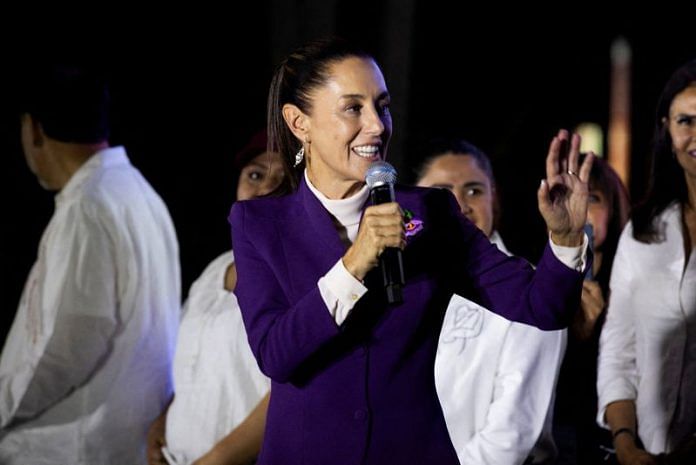By Adriana Barrera and Cassandra Garrison
MEXICO CITY (Reuters) – Claudia Sheinbaum, front-runner in Mexico’s presidential race, aims to overhaul water governance in the agriculture sector, the top user of the country’s scarce supply, with a potential investment of 20 billion pesos ($1.2 billion) per year.
Julio Berdegue, a member of Sheinbaum’s campaign team focused on water and the agricultural sector, told Reuters the candidate’s six-year plan will review existing water concessions, crack down on illegal use, update irrigation technology and revamp national water entity CONAGUA.
He cautioned the plan, details of which have not previously been reported, was still in development and could change.
Sheinbaum has said she plans to reform the National Water Law and develop a strategy to confront pervasive issues in Mexico, which is suffering from crippling drought, widespread water shortages, and heat waves in recent days so severe that howler monkeys are dropping dead from trees.
One of her main focuses will be Mexico’s powerful agriculture sector which uses nearly 80% of the country’s water to produce corn, wheat, soy, coffee, beans and avocados.
“(Mexico) requires a new general water law, appropriate for a country in climate change, where there is more population, where there is less water, where there are many industries that we want to reach with near-shoring that need water,” Berdegue said.
With elections just over a week away, the impacts of climate change are front and center for many Mexicans amid record temperatures. More than 70% of the country is dealing with some level of drought, according to government data.
Water shortages, especially in the metropolitan area surrounding capital Mexico City, have become routine.
Rather than come out entirely of the national budget, Sheinbaum’s government will look to secure other sources of financing, Berdegue said.
Experts have anticipated that Sheinbaum, a climate scientist and former mayor of Mexico City, will make water a main priority, though they predict a sweeping overhaul – especially within the agriculture sector – will face major challenges in confronting long-standing corruption and political polarization.
“It’s very uncomfortable because no one likes when farmers are protesting … but it’s the top water-consuming sector, and we have to find ways to figure out solutions to tackle this issue,” said Franck Gbaguidi of Eurasia Group.
Juan Cortina, president of the CNA, Mexico’s top farm lobby, said Sheinbaum’s proposed changes would be mostly welcome in the sector. A reform or new law, however, wasn’t the most important priority, he said, but, rather, enforcement.
“The truth is that we have not invested in the national water system for many decades,” Cortina said. “This requires more than a change in the law.”
Berdegue, a former official at the United Nation’s Food and Agriculture Organization, stressed Sheinbaum’s government would not revoke legal concessions. Instead, he said, it would crack down on those who break concession limits or sell water instead of using it themselves.
Berdegue estimated that between 40% and 50% of water that moves through the current system is lost to evaporation.
Sheinbaum’s plan would aim to recover that loss and ultimately secure more water for agriculture and domestic use.
The plan may include technology to monitor water usage according to concessions and control access once limits had been reached.
By the end of Sheinbaum’s six-year term, about 750,000 hectares would be updated and modernized, which would increase by 50% the current area in Mexico that has modern irrigation systems.
About 4.2 million hectares were deforested in Mexico between 2001 and 2021, just over 6% of the country’s total forests, according to official data, mostly to expand agriculture area. Sheinbaum would also seek to stem deforestation with an end-goal of stopping it completely, Berdegue said.
The plan could imply big changes for some producers, a delicate issue to navigate, Berdegue said, but farmers and industry groups would be invited to participate in talks.
($1 = 16.6207 Mexican pesos)
(Reporting by Adriana Barrera and Cassandra Garrison; additional reporting by Brendan O’Boyle; Editing by Alistair Bell)
Disclaimer: This report is auto generated from the Reuters news service. ThePrint holds no responsibilty for its content.



